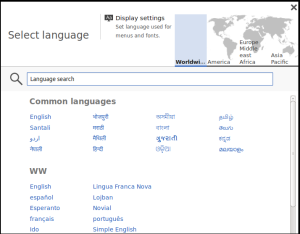The Internationalisation/Localisation (i18n/l10n) team at the Wikimedia Foundation works on a set of tasks every two weeks. This post is about the team’s accomplishment over the past two weeks.
You can also watch the 15 minute demonstration and check the slides.
Language Teams
Mediawiki supports over 350 languages. Supporting languages goes far beyond providing a localised interface. It includes ensuring that the overall experience of a language in which the user reads and contributes to Wikipedia (or any wiki running MediaWiki) is the same as it is to an English user. It is impossible to support without the help of volunteers in the respective languages. We have tried filling this gap through Language Support Teams. We are now starting an initiative to form and build strong language teams and have published a detailed plan. Please do let us know what you think about it.
Translation Memory on Wikimedia servers
The Translate extension is currently deployed on Meta-Wiki, mediawiki.org and a few other Wikimedia wikis to facilitate the translation of their content. In order to make translations faster and more consistent, a shared translation memory service has been enabled in the extension, which will provide translation suggestions from past translations of similar text.
Universal Language Selector Update

The Universal Language Selector (ULS) has a new top section in the default view. It now lists a set of “Common Languages”. They include languages spoken in your region (determined by geolocation), preferred languages from your browser (“Accept-Language”) and previously used languages. For many users, this should minimise the need to search for their language of choice in the list. The ULS now integrates with MediaWiki preferences, and performance was improved by using lazy loading.
Milkshake Update
jQuery.i18n, the internationalisation messaging framework library, saw the addition of support for gender, plural and grammar. All the language-specific rules that exist in Mediawiki are now available in jQuery.i18n. The framework is also built with scope for adding more extensible attributes in addition to the default ones. It supports lazy loading of translations.
Other accomplishments
- Translation UX tests continued, and led to improvemenents of the design prototypes for the translate extension, including new translator captchas. You can watch a short video about the project.
- We investigated solutions to support Indic languages on mobile platforms.
- We organized a bug triage on i18n issues.
- Apart from the usual bug fixes, a lot of Right-to-Left bugs were also fixed in the experimental PageTriage and ArticleFeedback v5 extensions, as well as in the veteran WikiHiero extension and core MediaWiki.
Srikanth Lakshmanan
Internationalisation/Localisation Outreach / QA Engineer

Can you help us translate this article?
In order for this article to reach as many people as possible we would like your help. Can you translate this article to get the message out?
Start translation